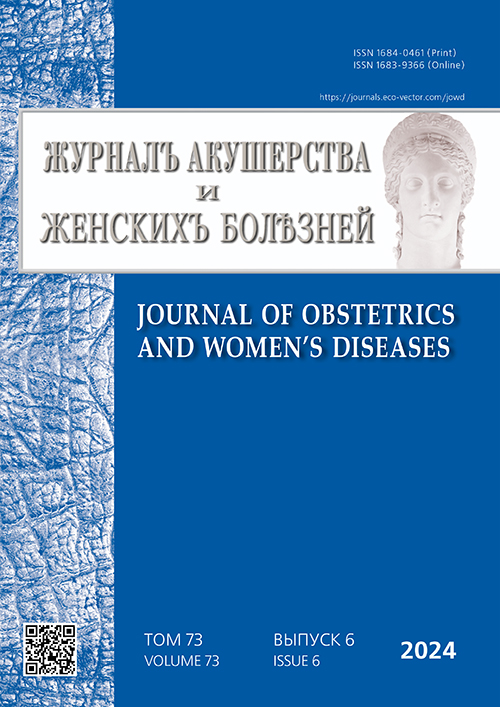Assessment of the current knowledge of obstetricians and gynecologists about preconception screening. A sociological survey
- Authors: Postnikova T.B.1, Mikhailova A.A.1, Bespalova O.N.1, Talantova O.E.1, Glotov A.S.1
-
Affiliations:
- The Research Institute of Obstetrics, Gynecology and Reproductology named after D.O. Ott
- Issue: Vol 73, No 6 (2024)
- Pages: 151-161
- Section: Original study articles
- Submitted: 08.10.2024
- Accepted: 11.10.2024
- Published: 06.12.2024
- URL: https://journals.eco-vector.com/jowd/article/view/636829
- DOI: https://doi.org/10.17816/JOWD636829
- ID: 636829
Cite item
Abstract
Background: Preconception screening is testing for carriage of recessive mutations of monogenic diseases in healthy spouses at the stage of pregnancy planning. In the Russian Federation, genetic testing and subsequent consultation by obstetricians and gynecologists are only carried out in two or three specialized centers. Obstetricians and gynecologists of the outpatient care service as the primary level of prevention do not often have information about these diseases and know where to refer patients for examination. It is not their responsibility to provide advice on this matter, but they should know the genetic centers where the patient or couple can be referred for further consultation. Increasing the level of knowledge of obstetricians and gynecologists will allow the widespread introduction of preconception screening as the primary stage of the prevention of hereditary diseases.
Aim: The aim of this study was to determine, based on the analysis of questionnaire data, the current level of knowledge and interest of obstetricians and gynecologists regarding issues of preconception screening.
Materials and methods: This study was conducted in the categorical field of medical sociology as one-time continuous research. A hundred of obstetricians and gynecologists from St. Petersburg, Russia who work in antenatal clinics, hospitals and private medical institutions participated in this sociological study on a voluntary and anonymous basis. To conduct the survey, an original questionnaire was developed, which included 21 questions. The survey was carried out using an electronic questionnaire (Google form).
Results: As a result of the survey, a hundred of obstetricians and gynecologists took part, including local doctors at district antenatal clinics, inpatient doctors, heads of departments, as well as obstetricians and gynecologists from private medical organizations. Analysis of the sociological survey data showed a satisfactory level of theoretical knowledge of obstetricians and gynecologists regarding preconception screening. At the same time, there is no general algorithm for managing data of the patients, their routing, and the scope of examination and diagnosis.
Conclusions: Our study emphasizes that the problem of preconception screening is relevant and requires a deeper understanding by obstetricians and gynecologists. The development of a methodological manual for obstetricians and gynecologists will increase the level of awareness of specialists, optimize the routing of potential patients and increase the effectiveness of the prevention of hereditary diseases with a recessive type of inheritance.
Full Text
About the authors
Tatiana B. Postnikova
The Research Institute of Obstetrics, Gynecology and Reproductology named after D.O. Ott
Author for correspondence.
Email: ptb20@mail.ru
ORCID iD: 0000-0002-8227-2629
SPIN-code: 5354-4640
MD
Russian Federation, Saint PetersburgAnastasiia A. Mikhailova
The Research Institute of Obstetrics, Gynecology and Reproductology named after D.O. Ott
Email: anamikhajlova@gmail.ru
ORCID iD: 0000-0002-5020-9561
SPIN-code: 2675-5857
Russian Federation, Saint Petersburg
Olesya N. Bespalova
The Research Institute of Obstetrics, Gynecology and Reproductology named after D.O. Ott
Email: shiggerra@mail.ru
ORCID iD: 0000-0002-6542-5953
SPIN-code: 4732-8089
MD, Dr. Sci. (Medicine)
Russian Federation, Saint PetersburgOlga E. Talantova
The Research Institute of Obstetrics, Gynecology and Reproductology named after D.O. Ott
Email: olga_talantova@mail.ru
ORCID iD: 0000-0003-3520-599X
SPIN-code: 9845-1631
MD, Cand. Sci. (Medicine)
Russian Federation, Saint PetersburgAndrey S. Glotov
The Research Institute of Obstetrics, Gynecology and Reproductology named after D.O. Ott
Email: anglotov@mail.ru
ORCID iD: 0000-0002-7465-4504
SPIN-code: 1406-0090
Dr. Sci. (Biology)
Russian Federation, Saint PetersburgReferences
- Glotov AS, Nasykhova YA, Dvoynova NM, et al. Prospects for preconception genetic screening at the pregnancy planning stage. Journal of Obstetrics and Women’s Diseases. 2023;72(6):173–192. EDN: KWZCRF doi: 10.17816/JOWD622752
- Nasykhova YuA, Karpovich LA, Dvoynova NM, et al. Modern molecular genetic methods and approaches used in the preconception carrier screening. Medical Genetics. 2023;22(12):20–32. EDN: AFZDME doi: 10.25557/2073-7998.2023.12.20-32
- Talantova OE, Postnikova TB, Mikhailova AA, et al. Modern view of preconception screening. Journal of Obstetrics and Women’s Diseases. 2024;73(1):149–156. EDN: UKZJSQ doi: 10.17816/JOWD623670
- Pletenskaya SR. Genetic screening for carriage of recessive diseases: the meaning and value of preconception preparation. Vestnik UGMU. 2023;(4):48–57. EDN: GPENQW
- Donnikov AE. Ethical issues related to preconception genetic screening: historical experience and current trends. Obstetrics and Gynecology. 2019;(11):46–54. EDN: FJXIGE doi: 10.18565/aig.2019.11.46-54
- Shubina E, Pavlova NS, Donnikov AE, et al. The use of exome sequencing for neonatal screening: opportunities and limitations. Neonatology: News. Opinions. Education. 2022;10(4):40–46. EDN: KGYJNG doi: 10.33029/2308-2402-2022-10-4-40-46
- Kashirskaya NYu, Petrova NV, Gembitskaya TE, et al. International experience in the primary prevention of cystic fibrosis (part two). Experimental and Clinical Gastroenterology. 2022;(8):160–170. EDN: GGKMLR doi: 10.31146/1682-8658-ecg-204-8-160-170
- Revazyan KZ, Meshkov AN, Ershova AI, et al. Genetic screening for heterozygous carriage of mutations that cause the development of monogenic recessive diseases. Russian Journal of Preventive Medicine. 2020;23(6–2):111–117. EDN: MXQLKM doi: 10.17116/profmed202023062111
- Kudryavtseva EV, Deryabina SS, Kovalev VV, et al. Prospects of screening for carriers of hereditary diseases in pre-conception preparation programs. Russian Bulletin of Obstetrician-Gynecologist. 2024;24(1):31–40. EDN: AMGFUI doi: 10.17116/rosakush20242401131
- Antonarakis SE. Nature Publishing Group. Carrier screening for recessive disorders. Nature Reviews Genetics. 2019;20(9):549–561. doi: 10.1038/s41576-019-0134-2
- Delatycki MB, Laing NG, Moore SJ, et al. Preconception and antenatal carrier screening for genetic conditions: the critical role of general practitioners. Aust J Gen Pract. 2019;48(3):106–110. doi: 10.31128/AJGP-10-18-4725
Supplementary files

















